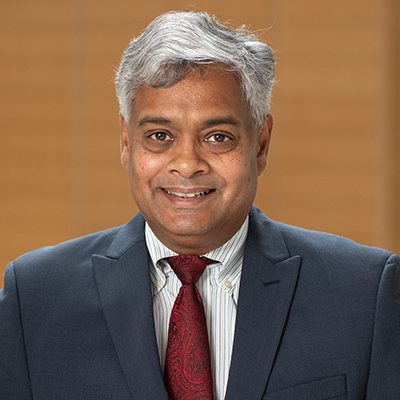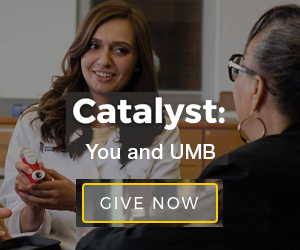Rajabrata Sarkar, MD, PhD

Barbara Baur Dunlap Professor of Surgery and Physiology
Chief, Division of Vascular Surgery
Executive Vice Chair, Department of Surgery
School of Medicine
Being named the University of Maryland, Baltimore (UMB) 2025 Founders Week David J. Ramsay Entrepreneur of the Year has been a full-circle moment for Rajabrata Sarkar, MD, PhD.
When Sarkar applied to become chief of vascular surgery at the University of Maryland School of Medicine (UMSOM) in 2008, Ramsay, the then-UMB president whose entrepreneurial vision created UMB’s BioPark, interviewed Sarkar for the position. They had a common background, both arriving at UMB from the University of California San Francisco.
Sarkar said he is overwhelmed to receive the Founders Week award, which was named in Ramsay’s honor after his death in 2020. In addition to being chief of the Division of Vascular Surgery, Sarkar is the Barbara Baur Dunlap Professor of Surgery and Physiology and executive vice chair of the Department of Surgery at UMSOM.
He is an expert in treating blood vessel disorders, a nationally known researcher in blood vessel growth and resolution of deep vein thrombosis, and a partner in the medical technology startup MDC Studio.
“We founded MDC in 2015 because we felt there was a gap between faculty disclosing potentially valuable device inventions to the University and the actual creation of a working and viable prototype that would appeal to investors to allow further development and successful commercialization of the invention,” Sarkar said.
He also is the co-founder of Vascular Rescue, Inc., part of the MDC Studio portfolio. Vascular Rescue is developing a novel prototype device for semiautomated central venous cannulation and emergency arterial cannulation that has the potential to expedite emergency care and reduce complications in critically ill patients.
Sarkar also is an inventor on four issued U.S. patents ranging from molecular therapy for vascular remodeling to novel emergency vascular devices. His device development work includes electroporation for repair of vascular injuries and wearable sensors for early detection of hemorrhage.
Sarkar’s inventions have focused on two areas.
“The first is drugs that help with vascular problems that we cannot fix with surgery, such as a drug that accelerates the shrinkage of a blood clot in the vein, which is a very common clinical problem,” he said. “The second area is devices that use automation and sensing to help less experienced doctors execute these procedures in a safer and better manner.”
James L. Hughes, MBA, UMB’s chief enterprise and economic development officer and senior vice president, said Sarkar embodies many of the characteristics UMB values in faculty entrepreneurs.
“He is dedicated to discovery and moving his research out of the lab and into the marketplace, he engages in and champions the University’s entrepreneurial initiatives, and he is an active participant in the Baltimore region’s innovation community,” Hughes said. “His prior experience advancing med-tech devices will be invaluable as he works to commercialize his automated vascular access device.”
Sarkar said he thinks the automated vascular access device is his most important invention.
“Large catheters have to be placed into central veins 5 to 7 million times a year in the United States,” he said. “This is a common yet hazardous procedure essential for life-saving therapy in intensive care units and emergency rooms. Our device allows a less experienced user to automatically place these catheters in a faster and safer manner.”
His device development work in conjunction with the Robert E. Fischell Institute for Biomedical Devices has been funded by the TEDCO Maryland Innovation Initiative, the UMB Life Science Discovery program (UM-BILD), and the Maryland Industrial Partnerships.
“Dr. Sarkar is one of our leading surgeon-scientists at the University of Maryland School of Medicine. Not only is he a clinician and leader, he also is a productive scientist and entrepreneur,” said Jason J. Rose, MD, MBA, FAHA, ATSF, associate dean, Innovation and Physician Science Development, UMSOM, and executive director and director of faculty entrepreneurship, UM-BILD.
“His research work is directly connected to creating better outcomes for our patients here in West Baltimore and beyond. Dr. Sarkar has advocated for our innovation and entrepreneurship ecosystem at the School of Medicine, UMB, and the Baltimore region for many years,” added Rose, who said he was thrilled that Sarkar received the Founders Week award.
Sarkar also serves as co-chair of the University of Maryland Medical Center Innovation Challenge Program, which encourages faculty and staff to submit ideas for funding to use innovation to help improve patient care, staff safety, and hospital efficiency.
He said he was inspired to become a vascular surgeon when he was a medical student and surgery resident.
“Vascular surgery requires great precision and has immediate gratifying results for both the patient and the surgeon. Restoration of blood flow is one of the most impressive things that we do in medicine and surgery, and stopping bleeding is even more dramatic,” he said. “My favorite part about being a surgeon is seeing a patient in the office who tells me that our surgery has changed their life or helped them regain employment.”
As an entrepreneur, Sarkar potentially could change the lives of even more patients.
“Surgery helps the patient in front of you. I enjoy working with the engineers and moving a novel clinical idea forward into a device that you can hold in your hand that someday might actually help many patients that you will never treat personally,” he said.
—Jen Badie



